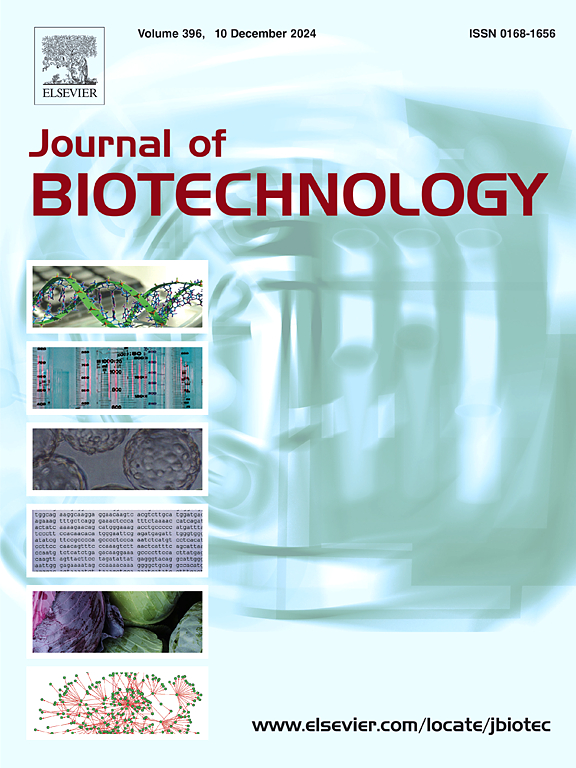采用前体池组合代谢工程策略提高刺槐多糖的产量。
IF 4.1
2区 生物学
Q2 BIOTECHNOLOGY & APPLIED MICROBIOLOGY
引用次数: 0
摘要
刺五加是由刺五加孢属(Saccharopolyspora spinosa)产生的一种杀虫剂,其杀幼虫活性被认为是一种很有前景的防治农作物害虫的方法。本研究的目的是通过以下步骤增加酰基-CoAs 前体的供应,从而提高刺五加的合成。(i) 通过过表达β-氧化途径中的关键基因,对该途径进行工程化改造,以促进尖孢噻吨的合成。结果表明,过表达 fadD、fadE 和 fadA1 基因,以及共同表达 fadA1 和 fadE 基因,可使尖孢霉素的产量分别提高 0.36 倍、0.89 倍、0.75 倍和 1.25 倍。(ii) 采用β-氧化途径和 ACC/PCC 途径的组合工程来促进刺五加的合成。结果表明,当 fadE 和 pccA 以及 accC 和 fadE 共同表达时,尖孢苷的产量分别增加了 1.77 倍和 1.43 倍。(iii) 当发酵培养基中加入外源三酰甘油时,单纯的 β 氧化途径工程可使尖孢霉素的产量增加 7.13 倍,达到 427.23 毫克/升。而β-氧化途径和ACC/PCC途径的组合工程则使尖霉素的产量增加了9.61倍,达到625.17mg/L,进一步优化培养基后,尖霉素的产量更高,达到1293.43mg/L。该研究结果表明,上述组合策略可促进尖孢霉素的高效生物合成。本文章由计算机程序翻译,如有差异,请以英文原文为准。
Combinatorial metabolic engineering strategy of precursor pools for the yield improvement of spinosad in Saccharopolyspora spinosa
Spinosad is an insecticide produced by Saccharopolyspora spinosa, and its larvicidal activity is considered a promising approach to combat crop pests. The aim of this study was to enhance the synthesis of spinosad through increasing the supply of acyl-CoAs precursor by the following steps. (i) Engineering the β-oxidation pathway by overexpressing key genes within the pathway to promote the synthesis of spinosad. The results showed that the overexpression of fadD, fadE, and fadA1 genes, as well as the co-expression of fadA1 and fadE genes, increased the yield of spinosad by 0.36-fold, 0.89-fold, 0.75-fold and 1.25-fold respectively. (ii) Employing combinatorial engineering of the β-oxidation pathway and ACC/PCC pathway to promote the synthesis of spinosad. The results showed that the co-expression of fadE and pccA, as well as accC and fadE, resulted in a 1.77-fold and 1.43-fold increase in spinosad production respectively. (iii) When exogenous triacylglycerol was added to the fermentation medium, the solely engineering of the β-oxidation pathway increased the yield of spinosad by 7.13-fold, reaching 427.23 mg/L. While the combinatorial engineering of both the β-oxidation pathway and ACC/PCC pathway increased the yield of spinosad by 9.61-fold, reaching 625.17 mg/L, and further optimization of the culture medium resulted in an even higher yield of spinosad, reaching 1293.43 mg/L. The results of this study indicate that the above combination strategy can promote the efficient biosynthesis of spinosad.
求助全文
通过发布文献求助,成功后即可免费获取论文全文。
去求助
来源期刊

Journal of biotechnology
工程技术-生物工程与应用微生物
CiteScore
8.90
自引率
2.40%
发文量
190
审稿时长
45 days
期刊介绍:
The Journal of Biotechnology has an open access mirror journal, the Journal of Biotechnology: X, sharing the same aims and scope, editorial team, submission system and rigorous peer review.
The Journal provides a medium for the rapid publication of both full-length articles and short communications on novel and innovative aspects of biotechnology. The Journal will accept papers ranging from genetic or molecular biological positions to those covering biochemical, chemical or bioprocess engineering aspects as well as computer application of new software concepts, provided that in each case the material is directly relevant to biotechnological systems. Papers presenting information of a multidisciplinary nature that would not be suitable for publication in a journal devoted to a single discipline, are particularly welcome.
 求助内容:
求助内容: 应助结果提醒方式:
应助结果提醒方式:


